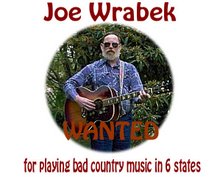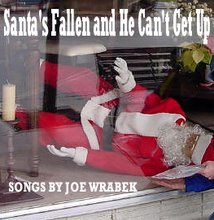Well, the plumbing emergency is over. (Most folks probably weren’t aware there was one.) What it took to fix it is a deterrmined application of the proper tool in the right place—and persistence. Winston Churchill’s answer to how to win World War II: “Never, never, never, NEVER give up.” Not bad rules to apply to everything, really.
FAILED ECONOMY SHOW has gotten some nice submissions, and more keep coming in. I’ve made copies of an hour’s worth for the band; we’ll pick through those, decide which we want to do, and then do it again with another hour’s worth. I think it may be best to keep everything simple—we’ll only have about a month in which to learn all of these, and get ‘em performance-ready. And once again, it may be me singing them.
As many as six of my songs, as many as five from Woody Guthrie (Voice of the Last Depression), as many as three from Stan Good (I’ve musicated two, and still have a third to do), and a bunch of “other.” I want a broad mix of styles, and all upbeat, uptempo, or both.
Simultaneous with practice, there’s PROMOTION. The local media, of course; this time, the concert will be a news story, and we should break into local radio the same way. Posters county-wide (and suggestions to the other area food banks that we could maybe do the same for them, too). We’ll have it filmed for cable TV; since the conglomerate that owns the cable TV system here can’t just run something locally, it’ll have to be broadcast everywhere in two counties (it’s hard to feel bad about that)—so we can run contact information for all the food banks in those two counties along with the broadcast.
And then, there’s the RECORD. We will attempt to make an audio record of the performance; John’s recorder can handle it (it’ll take two CDs), and my 6-channel mixer says it can record at the same time it’s feeding an amplifier—the only one way to tell for sure is to do it. We’ll take the best dozen songs from the concert—re-recording them if we have to—and put them on a CD. The CD itself will be a benefit for local food banks—any one that sells it. Sell for $10, food bank keeps $5. The $5 to us should just pay for production costs, based on my experience with the Broken Record project.
Since at least half the songs on the CD will not be ones I wrote, copyright royalties will have to be paid to the authors; I asked a music publisher I know (the only one I’ve dealt with on other than a rejection-letter basis) how to proceed with that, and got this advice:
Outside-Services-the-Record Company can pay royalties directly to the authors. I do not have to become a publisher, or deal with one. I simply draft up a contract (there are apparently no good templates) with each author, saying this is a nonexclusive deal in which Author allows Record Company to use their song, [insert name] on this here album [insert name] for the purpose of this here charity (i.e., the food bank). Since there is no publisher involved, the authors retain the publishing rights (4.55 cents per song per record manufactured—not sold—the same amount the author gets. The publisher suggested sweetening the deal for the food bank by asking the authors to also donate their publishing royalties for (say) the first 1,000 copies to the food bank as well.
And that’s it. Since there is no publisher involved in the arrangement, it’s my job as The Record Company to pay the authors their 4.55 cents per (plus their 4.55 cents per in publishing rights, if they’re retaining those, too) when the CDs are manufactured (probably when they’re delivered to me by the company that does that). If the album gets sold digitally on CDBaby (and why not?), CDBaby will send The Record Company (me) small amounts of money to distribute to the authors. The same will happen if the song is downloaded from something like iTunes.
There are a few other considerations for the authors. These are not essential to the record deal, but they might amount to a few more pennies for the authors down the road. The authors should register as writers with either ASCAP or BMI if they haven’t yet, and say they are self-published; they should make sure the song of theirs that’s going to be on the record is “registered” with whichever PRO they sign up with. That way, if the song is ever played on a radio station that ASCAP or BMI ever monitors (one should not hold one’s breath), the author could end up getting a few more pennies. Those pennies would be distributed by ASCAP or BMI, not me.
Joe
WELCOME...
This blog is the outgrowth of a songwriting workshop I conducted at the 2006 "Moograss" Bluegrass Festival in Tillamook, Oregon. It presumes that after 30-odd years of writing and playing music, I might have something to contribute that others might take advantage of. If not, it may be at least a record of an entertaining journey, and a list of mistakes others may be able to avoid repeating.
This blog is intended to be updated weekly. In addition to discussions about WRITING, it will discuss PROMOTION--perhaps the biggest challenge for a writer today--as well as provide UPDATES on continuing PROJECTS, dates and venues for CONCERTS as they happen, how and where to get THE LATEST CD, the LINKS to sites where LATEST SONGS are posted, and a way to E-MAIL ME if you've a mind to.
Not all these features will show up right away. Like songwriting itself, this is a work in progress. What isn't here now will be here eventually. Thank you for your interest and your support.
Subscribe to:
Post Comments (Atom)



No comments:
Post a Comment